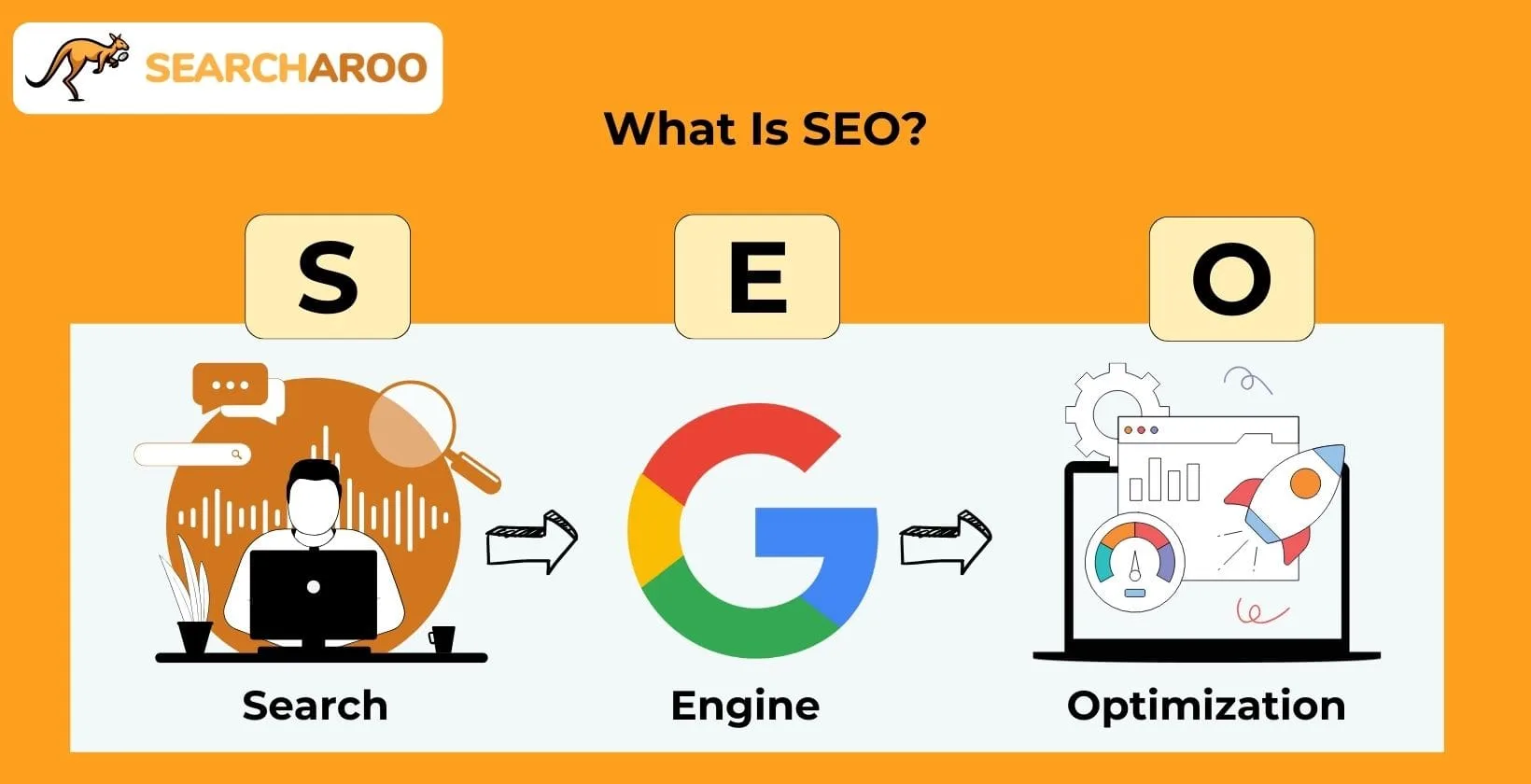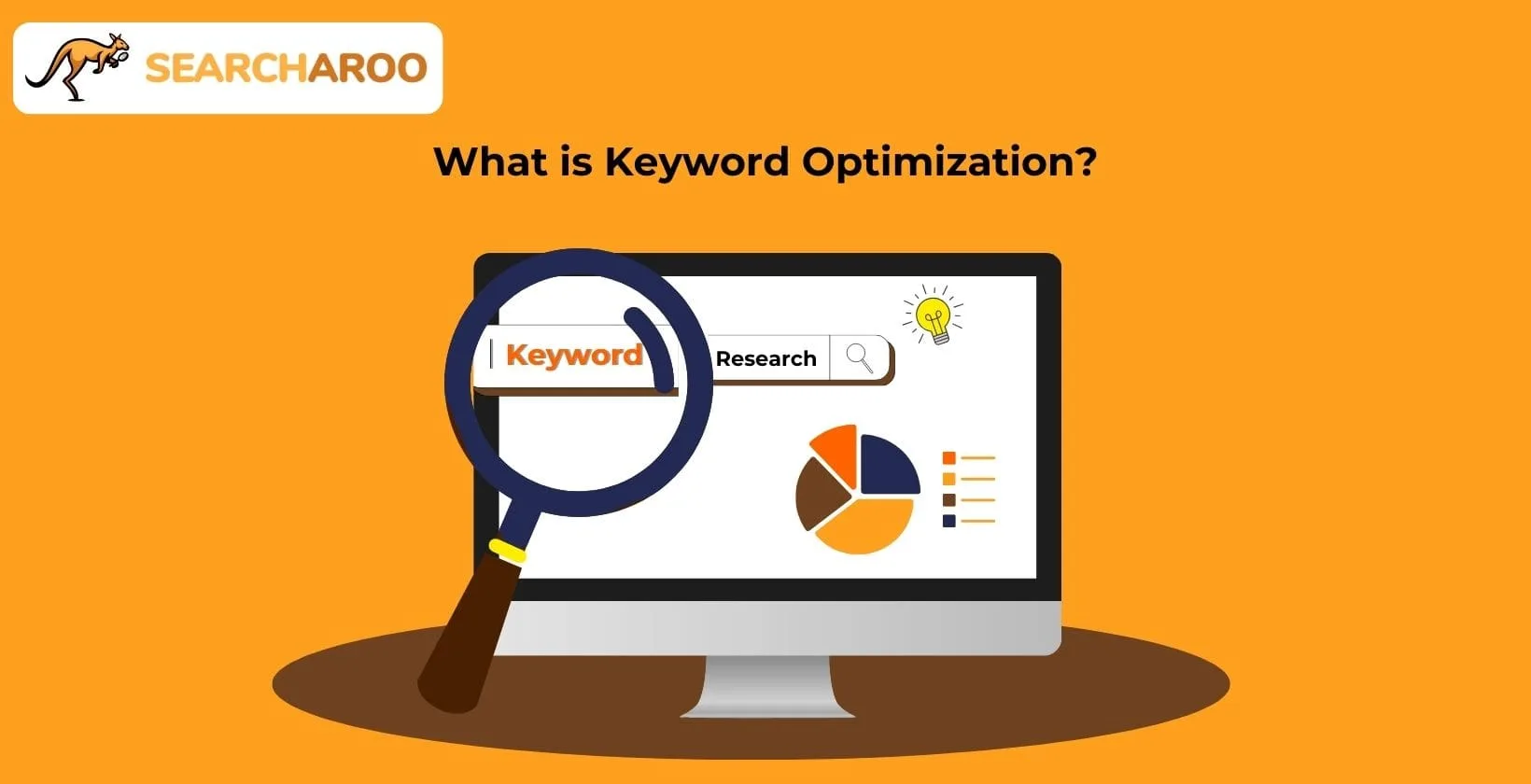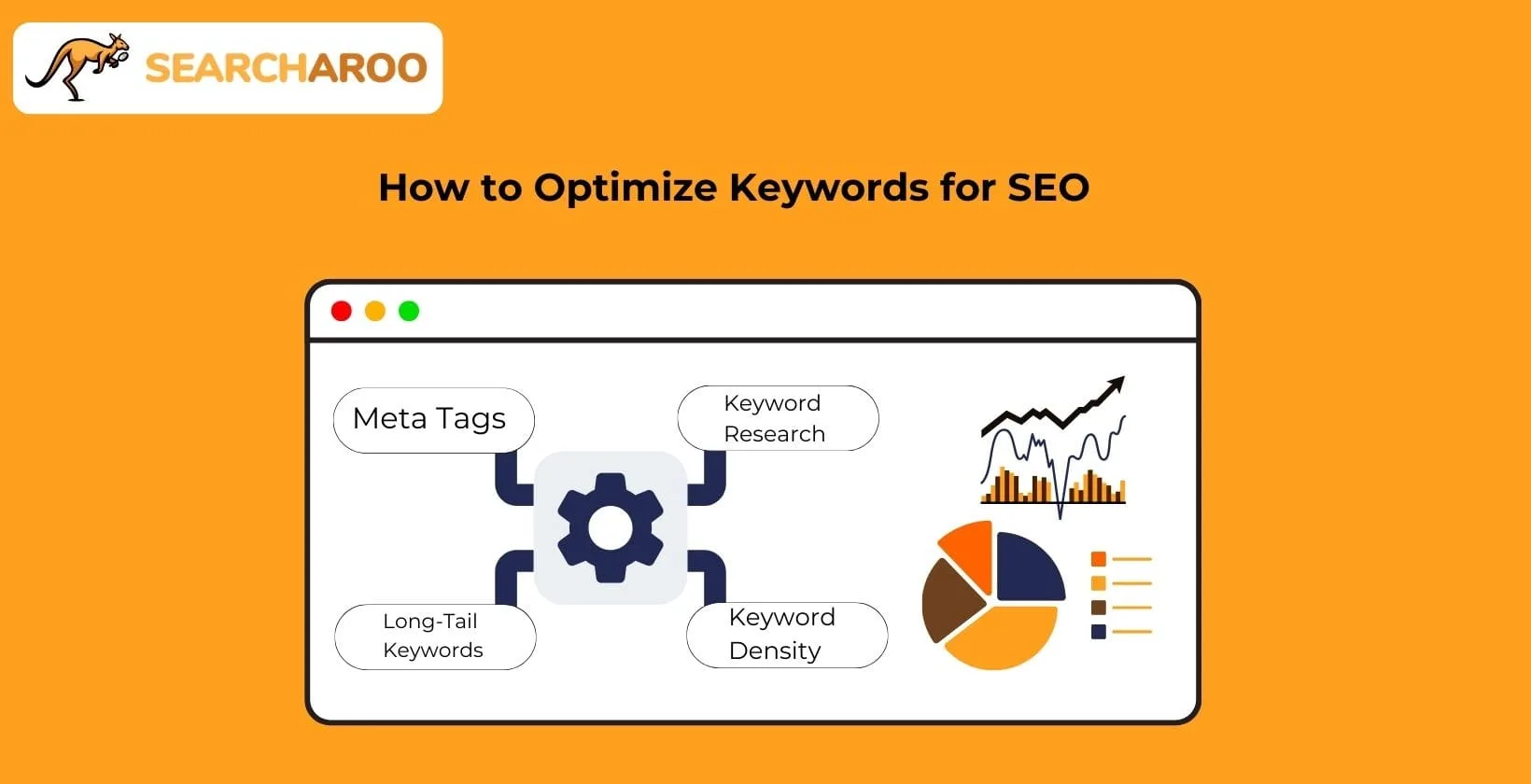As you refine your content strategy, you might wonder if there’s a more direct path to improve search rankings without extensive backlinking, writing thousands of words of content, or using manipulative SEO tactics. Fortunately, incorporating keyword optimization into your SEO efforts can boost your site’s visibility and increase traffic with less effort.
Keyword optimization forms the foundation of effective SEO strategy, which enables websites to rank higher in search results while attracting relevant traffic that matches user search intent. But what exactly is keyword optimization, and how can it benefit your content strategy?
This section will explain the concept of keyword optimization and show how it can improve your content’s performance in search engines. We will also go over some efficient keyword optimization tactics for your content. By the end of this post, you should have a solid basic grounding in SEO and keyword optimization.
What Is SEO?

SEO, or search engine optimization, refers to improving your website to increase its appearance in search engines like Google and Microsoft Bing when people search for relevant terms. Success in SEO means users find and visit your site more often when they search.
Higher visibility in search results means a greater likelihood of your sites being discovered and clicked. The main goal of SEO is to attract more visitors who could become customers, clients, or regular viewers of your content.
Every year, billions of people perform trillions of searches, searching a crucial website traffic source. Hence, optimizing your website for search engines on any platform where people might search for your brand or organization is essential.
This involves knowing how search engines evaluate content and creating content that aligns with these criteria. Now, let’s examine a key element of SEO: understanding what keywords are and how they function in search engine optimization.
What Are Keywords for Search Engine Optimization?
SEO keywords, or “keywords,” are words and phrases that users type into search engines like Google to find information, products, or services. Optimizing your web pages with popular keywords can help you rank higher and bring more visitors.
To find which SEO keywords to use, you must conduct keyword research.
This process involves using tools and strategies to discover what your target audience searches for, analyze the competition for these keywords, and assess how they align with your goals and existing content.
Keyword research involves identifying and analyzing search terms entered into search engines to leverage this data for SEO or marketing purposes. It allows you to understand which queries to focus on, their popularity, competition levels, and more.
Gathering data on the exact terms people use can inform your content strategy and broader marketing efforts, seamlessly transitioning into understanding why keywords are crucial for SEO success.
Why Are Keywords Relevant for SEO?
When users input terms into a search engine, it displays the top-related results based on the match between the search terms and keywords found on web pages, along with other factors.
Search engines scan websites to find terms related to what you’re looking for. By incorporating relevant keywords into your content, you boost your chances of showing up at the top of the search results when people search for something similar.
Utilizing the right keywords for your niche enhances your SEO strategy.
Ensuring these keywords align with your content and users’ search intent helps maintain the interest of visitors who arrive organically at your page. This alignment improves your content marketing strategy and leads to better conversion and higher click-through rates (CTRs).
This strategic approach sets the stage for optimizing these keywords further, which raises an important question in enhancing SEO effectiveness.
What is Keyword Optimization?

Keyword optimization involves selecting and using the right keywords in your content so that your target audience can easily find your pages in search engine results, a vital component of on-page SEO success.
The goal of keyword optimization is to ensure that the chosen keywords effectively drive the most relevant traffic to your site and secure high rankings in the search engine results pages (SERPs). This allows the appropriate audience to locate your content easily.
Keywords serve a dual purpose: they inform search engine algorithms about the content’s subject matter and indicate which search queries should lead to your content as a top result.
Given that the usage of search terms evolves and new content continuously emerges, keyword optimization can be an ongoing effort.
You may find that the keywords that once boosted your search standing need adjustment over time. Understanding this dynamic is key to grasping why keyword optimization is so important in digital strategy.
Why is Keyword Optimization Important?
In a world where millions of blogs are written daily, your content needs to stand out to reach the right audience. Keyword optimization is a powerful strategy to align your published material with the search terms your target audience uses.
If your website doesn’t appear in search results, your target audience won’t find, read, or engage with your content, much less purchase what you’re offering. By optimizing your content with relevant keywords, it becomes far easier for potential customers to find your pages when they search for related products, services, or information.
Effective keyword optimization increases your visibility in search results, driving more traffic to your website. More importantly, it attracts quality traffic—visitors genuinely interested in what you offer. Once these visitors land on your site, they will likely convert into leads or customers.
Ensuring your content thoroughly covers related subtopics and aligns with search intent through keyword optimization enhances your site’s topical authority. This strategic approach aids in distributing authority across your site’s pages, effectively supporting your content strategy.
How to Optimize Keywords for SEO

Optimizing keywords for search engines requires analyzing search volumes, competition levels, and user intent before strategically placing these keywords in titles, headers, content, and meta descriptions to signal relevance to search algorithms. You need clear metrics that guide other SEO strategies. This process involves identifying the right keywords to ensure your content aligns with user searches, but determining the optimal terms and their frequency to avoid keyword stuffing presents a challenge.
Writers and SEO practitioners approach this task in various ways, utilizing tools ranging from free options like Google Search Console, Google Analytics, and Google AdWords to paid services from companies like SemRush or Ahrefs.
These SEO tools offer valuable insights into keyword performance and related terms, helping you refine your keyword selection for every new content piece you develop.
As we explore these methods, we’ll also share some practical techniques for optimizing these keywords for maximum effectiveness.
Keyword Optimization Techniques
Integrating term optimization into your keyword research techniques can be straightforward and effective with careful planning.
Content keyword optimization requires balancing keyword density with natural readability, placing primary keywords in strategic locations such as introductions, headings, and conclusions, which signals relevance to search engines without compromising the quality of information presented to readers.
We’ve gathered some practical tips for enhancing your SEO through effective keyword optimization to aid in your keyword planning. Below, you’ll find our top seven recommendations to refine your approach.
1. Start With a Content Audit
Starting with a content audit is an effective first step in keyword optimization.
This process allows you to evaluate the current use of keywords within your content and spot opportunities to enhance your search engine rankings by strategically placing targeted keywords.
By conducting a keyword audit, you clearly understand your content’s status and the effort required to optimize it to achieve better results. For a more streamlined approach, using a keyword audit tool can save time and provide quick insights, which is a practical method to boost your on-page SEO with just a few basic tools.
During the audit, consider the following elements:
| Title Tags | These should be unique and concise, ideally between 50 and 65 characters, accurately reflecting the page’s content to inform search engines. |
| Meta Descriptions | Keep these concise (100 to 155 characters) and ensure they summarize the webpage content accurately. Including key target keywords without overstuffing is essential. |
| Header Tags | Your page should feature properly styled HTML headings (H1, H2, etc.), which help search engines understand the page’s content focus. |
| URL Structure | URL optimization for targeted keywords requires creating concise web addresses that incorporate your primary keyword phrases while accurately reflecting page content, which helps search engines understand page relevance and improves user experience by making links more memorable and descriptive. |
| Images and Alt Descriptions | Use relevant file names and alt text for images, which aids in search ranking and improves accessibility. |
| Content Quality | Ensure the content is engaging and relevant. To enhance readability and retention, aim for a minimum of 300 words. |
| Link Checks | To maintain site integrity, regularly verify that all internal links are functional and remove any broken links. |
| Social Media Integration | Incorporate links to social media and sharing options to facilitate the organic spread of your content. |
2. Find the Right Keywords For Your Site
After evaluating and refining your existing pages and strategies, focus on selecting precise keywords. Ensure you add the most effective keywords to your website pages rather than every term on a lengthy list.
Begin your keyword research by testing different phrases in browsers or using a keyword research tool to identify optimal keywords. Create a list of terms related to your content, and systematically test each keyword through searches or tools.
Monitor the performance metrics for each keyword on your list. Consider their popularity and conversion rates. Keyword optimization tools can also suggest additional, related keywords, providing opportunities to enhance your site with new primary keywords for creating or updating content.
The challenge often lies in differentiating between a relevant keyword and one less suited to your content.
To conduct keyword research manually, use Google Search and observe the following:
- Note any suggestions from Google Autosuggest.
- Record keywords from the “People also ask” section.
- Check related keywords at the bottom of search result pages.
- Document these keywords.
- Repeat for each relevant keyword you’ve identified.
Compile and analyze your list to pinpoint the most effective keywords for your content, repeating with similar searches to cover all associated terms.
A thorough content audit should reveal keywords with high search volumes, indicating strong public interest. While low search volume isn’t necessarily detrimental, targeting high-volume keywords should be a strategic priority.
3. Optimize Your Keyword Density
Optimizing your keyword density goes beyond merely placing your main keywords at various points in your text after identifying them. Keyword density serves as an important signal for search engines to understand the context and identify clusters of terms.
The concept of keyword density extends past the simple frequency of a term within a text. It involves a balance, informed by text analysis techniques such as term frequency and inverse document frequency, to ensure relevance without redundancy.
Ensuring your keyword strategy avoids the pitfall of keyword stuffing is vital; it can disengage your readers and trigger penalties from Google. With advancements in search engine algorithms, techniques like keyword stuffing that might have once been effective are now easily detected and penalized.
4. Map Your Keywords Carefully
Keyword mapping is a strategic process used across your entire website. After you’ve identified a list of keywords relevant to your site’s content, analyze each to decide which page should feature which. This strategy prevents the overload of your homepage with all keywords or the repetition of the same keywords on multiple pages.
Make decisions about keyword placement based on the specific content of each page. Consider what makes each page unique and arrange the keywords to reflect this uniqueness. It’s also useful to research each keyword to see the top search results; this helps you understand what content performs well with these terms.
Positioning a specific term on a page should align with content similar to that found in top search results. These top performers are your competition, and your goal with SEO is to surpass them in search rankings for your chosen keywords.
5. Make Sure Your Content Matches Search Intent
Ensuring your content aligns with search intent is essential. You might have taken all the necessary steps to optimize your page for top search rankings, only to discover that your visitors were searching for something entirely different using the same terms. Missing the mark with search intent can lead to two undesirable outcomes.
Firstly, your content attracts visitors outside your target audience. In that case, they might quickly leave your site upon realizing it doesn’t meet their needs, potentially dismissing it as a future resource. This behavior, known as “pogo-sticking,” signals to search engines that your content may not match the intended keywords, which could harm your site’s credibility.
Secondly, if your content doesn’t resonate with the intended audience’s needs, they may never find your site in their search results, leading to no organic traffic. It’s essential to refine your keywords to better capture the true intent of your target audience, especially with terms related to specific locations in local SEO.
If your visitors see that the content doesn’t reflect their search needs, they will likely leave quickly. To combat pogo-sticking and improve your site’s ranking, it’s important to align your page content with your users’ expectations. Using SEO tools to analyze the intent behind your keywords or reviewing the common themes among top-ranking results can guide your strategy.
Taking the time to accurately match your keywords to user intent not only enhances your site’s relevance but also sets the stage for the next steps in further optimizing your content.
6. Add Keywords to Your Pages
Website keyword optimization requires strategic placement of researched keywords throughout your site’s structure, including URLs, title tags, headers, content body, and meta descriptions, which creates a cohesive semantic framework that search engines can easily interpret. For some terms, this integration is straightforward. Implementing keyword clustering can streamline this process by grouping related terms and enhancing relevance and readability.
However, for others, fitting a specific keyword into your text without creating awkward sentences can be challenging, requiring inventive approaches to avoid unnatural content and keyword stuffing.
Key on-page SEO elements like your page title, URL, and header tags are important for your ranking. Ensure that your most relevant and strategic keywords appear in these elements.
“Best” refers to those keywords with the highest search volumes and less competitive terms that you aim to rank for dominantly.
7. Optimize your Meta Information
Meta keywords optimization involves incorporating your primary keywords naturally into title tags and meta descriptions, which should remain concise (between 50-65 characters for titles and 100-155 characters for descriptions) while accurately reflecting page content to improve click-through rates.
Your title tags should be engaging and relevant, incorporating one or two main keywords. Likewise, your meta descriptions should be concise, containing your target keywords and, ideally, a few related terms to cover various relevant search queries.
Remember, the keywords you select for your anchor text are also vital, as anchor texts help search engines understand your site’s content.
By focusing on these SEO elements, you help ensure that your content appears prominently on search results pages, making it more likely that potential customers using relevant search queries will click through to your site. This careful attention to keyword placement sets a strong foundation for further refining your site’s visibility.
Should You Buy Keyword Optimization Services?
Buying keyword optimization services involves looking at your needs and what you can handle internally. Here are some points to consider when thinking about getting professional help:
- Expertise: SEO professionals know their stuff. They keep up with the latest trends and rules, which can be hard to follow if it’s not your main job.
- Time-Saving: Handing over this part of your business to experts frees you up to focus on other important tasks.
- Better Tools: Agencies can access advanced tools that help them do the job better and faster. These tools can be too pricey for many businesses to justify.
- Keeping Up: SEO experts make it their job to stay on top of changes and adjust your strategy accordingly. This helps keep your content fresh and competitive.
If you’re stretched thin and could use some help, ensuring your SEO is done right might be worth the investment.
Why Choose Searcharoo for Your Keyword Optimization Needs?
Choosing Searcharoo for your SEO needs comes with benefits that make us stand out:
- Custom Strategies: We look at your needs and build a plan that fits your business and audience.
- Proven Success: We’ve helped other businesses improve their online visibility and can show you real examples of our work.
- Full-Service: We handle everything from the start of keyword research to continuous updates and monitoring.
- Ethical Approach: We play by the rules to boost your site’s ranking without risking penalties for shady tactics.
If you’re looking for a reliable partner to help you manage your SEO, consider giving Searcharoo a shot.
Wrapping Up: Key Strategies for Keyword-Driven SEO Success
Keyword optimization analysis involves tracking how your targeted keywords perform in search rankings over time, which helps identify opportunities for improvement and validates the effectiveness of your optimization efforts through tools like Google Search Console or Ahrefs. Use tools like Google Search Console or Ahrefs to check your positions for each keyword.
The keyword optimization process follows a systematic workflow of conducting content audits, researching relevant terms, analyzing competition, mapping keywords to specific pages, integrating them naturally into content, and monitoring performance through analytics tools to make continuous improvements. Search engine marketing progresses slowly yet consistently delivers substantial results as you climb the rankings for relevant search terms.
As you persistently update and refine your content with the appropriate keywords, expect your search results to improve. You’ll want to ensure that when search engine crawlers visit your site, they recognize it as a valuable resource deserving of a high spot in organic search results.





